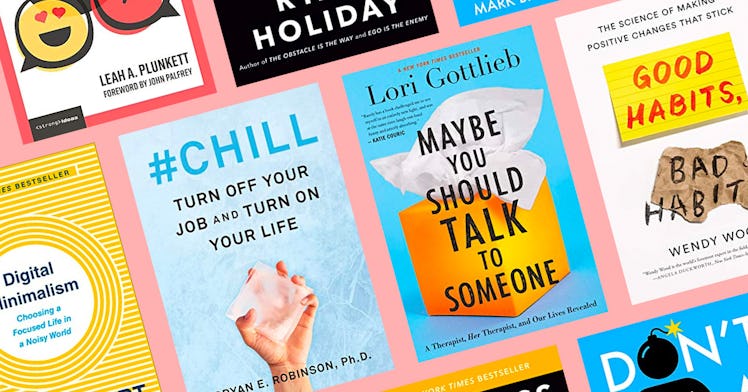The Best Self Help Books For Men of 2019
Who's up for a little motivation?

Want to have better routines? Form a less toxic relationship with your phone? Make your mind a bit less busy? The best self-help books of 2019, written by psychologists, legal scholars, philosophers and more, offer unique perspectives on these topics and more. Each is smart, helpful, and written in a refreshing bluntness that makes them feel like smart things said over coffee by a kindly mentor who’s not afraid to confront you with deep questions or crack the whip. We’re certain there’s one on here that will help bring a small, or maybe even big, change to your life.
Here, Cal Newport, a computer scientist at Georgetown and author of Deep Work, makes a case for a ‘digital detox.’ He argues that smartphones, apps, and screen time have greatly diminished our quality of life, not just because we’re looking at screens and engaging in a non-physical social world, but largely because of what he refers to as a ‘fragmenting’ effect — that the 10 seconds it takes for you to look at your phone greatly diminishes the quality of any in-person experience you may be having at that time. His solution? A 30-day plan where followers pare down all non-essential technology, and after those 30 days are over, begin using tech again with intention. It’s something from which all of us can benefit, if we can muster the courage to do so.
#Chill is the book for the guy who knows that they can’t really change overnight. For those who bring the office home with them at night and over the weekends, and would rather spend that time relaxing with family and friends, this book gives a bit of a guidebook to engage with a monthly program to “stop the cycle of over-work.” Bryan Robinson largely employs the use of mindfulness and meditation practices that help the over-worked take a deep breath and remain present.
In writing about her own need to see a therapist, Gottlieb, a sought-after psychotherapist with decades of experience who pens The Atlantic‘s “Dear Therapist” column, breaks the wall of the therapeutic class (Yes, they judge) and examines, as both a therapist and someone on the other side of the couch, the stories we all tell ourselves.
Wendy Wood is a psychologist and the Provost Professor of Psychology and Business at the University of Southern California. In this book, she explores the nature of habit formation in her with a refreshing frankness. Forming habits doesn’t have to be difficult. Neither does doing away with a bad habit. That’s not to say it’s as easy as doing nothing, but you certainly can’t create good habits by engaging in self-denial and limiting yourself. It’s all about changing perspective. This book will help you do just that.
“Sharenting,” posting photos and stories of moments from a child’s early life to social media is a rite of modern parenting. While this can help make the unsteady and isolating new world of mother and fatherhood bearable, it deserves a deeper look. Should so much information be out there? Should a child have say about what moments are or aren’t posted? Is it right to have the world aware of every step of a child’s life before they’re even born? In Sharenthood, Plunkett, a Faculty Associate at the Berkman Klein Center for Internet and Society at Harvard University, presents, with humor, insight, and a laudable broad-mindedness, a look at all concerns, both hypothetical and glaringly real, that parents should consider.
In his new book Stillness is the Key, philosopher and author Ryan Holiday, whose other books include The Obstacle is the Way and Ego is the Enemy draws from the lessons of history to show how leaders and thinkers — from Marcus Aurelius to JFK — drew on stillness to benefit themselves and the world at times of crisis. He builds the case for all of us to set up systems, interrogate our own reactions, and think: What can I do to be the best person for myself and my family? It’s a tough question, certainly. But one this book is more than armed to answer.
An uncomfortable truth: We can all be dicks. At one time or another, we all have dickish tendencies. We’re grumpy, tired, stressed, pissed off and, try we might, those emotions manifest as pure dick-itude. Another uncomfortable truth: A lot of us like to think that it can’t be us, that we must be feeling isolated and misunderstood because we were at the mercy of other dicks. Wrong. Borg makes this clear and lays out a game plan to interrogate our behavior and be more mindful of the choices we make.